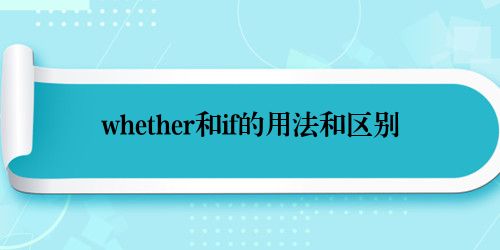
导语:Whether和if是两个常用的连词,在英语中经常用来引导宾语从句、名词性从句以及表示选择。虽然它们在很多情况下可以通用,但在某些情境下却有着不同的用法和含义。
一、定义及用法:
Whether和if都可以用来引导宾语从句或名词性从句,表示“是否”的意思。比如:
1. I don't know whether/if he will come to the party tonight.(我不知道他今晚是否会来参加聚会。)
2. The question is whether/if we should go by car or by train.(问题是我们应该坐车还是坐火车。)
不过需要注意的是,当whether用来引导宾语从句时,通常用在介词后面,而if则没有这种限制。比如:
3. I am not sure whether she is telling the truth.(我不确定她是否在说真话。)
4. I wonder if she will be able to finish the project on time.(我想知道她是否能够按时完成这个项目。)
二、表示条件:
在表示条件时,if是更常用的一个选择。比如:
1. If it rains tomorrow, we will have to cancel the picnic.(如果明天下雨的话,我们就必须取消野餐计划。)
2. You can have dessert if you finish all your vegetables.(如果你把所有蔬菜都吃完了,你就可以吃甜点。)
三、偏好用法:
在一些情况下,whether和if可以互换使用,但在一些特定的场合中,更倾向于使用其中一种。比如:
1. We can't decide whether or not to go on vacation this year.(我们无法决定今年是否要去度假。)
2. She asked if she could borrow my phone.(她问我是否可以借我的手机。)
在这种情况下,whether和if都可以正常使用,但在口语表达中,更常见的是if。
四、否定形式:
在否定句中,通常更倾向于使用whether而非if。比如:
1. I don't know whether he will be able to come to the meeting.(我不知道他是否能来参加会议。)
2. She is unsure whether or not she should take the job offer.(她不确定是否应该接受这份工作提议。)
总结:
无论是whether还是if,在很多情况下都可以互相替换使用,但在一些具体的语境下,它们之间还是存在一些微妙的区别。在选择使用时,需要根据具体语境和惯用表达进行选择。希望本文的介绍对大家更好地理解和运用whether和if有所帮助。